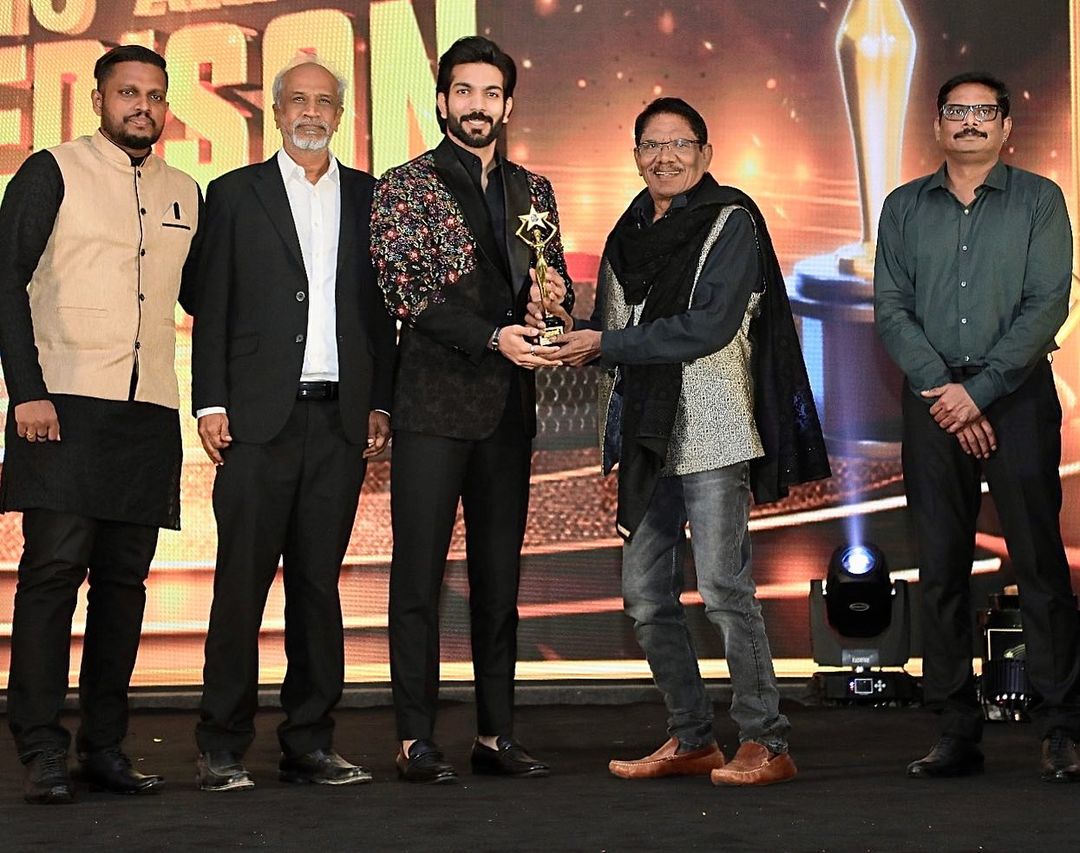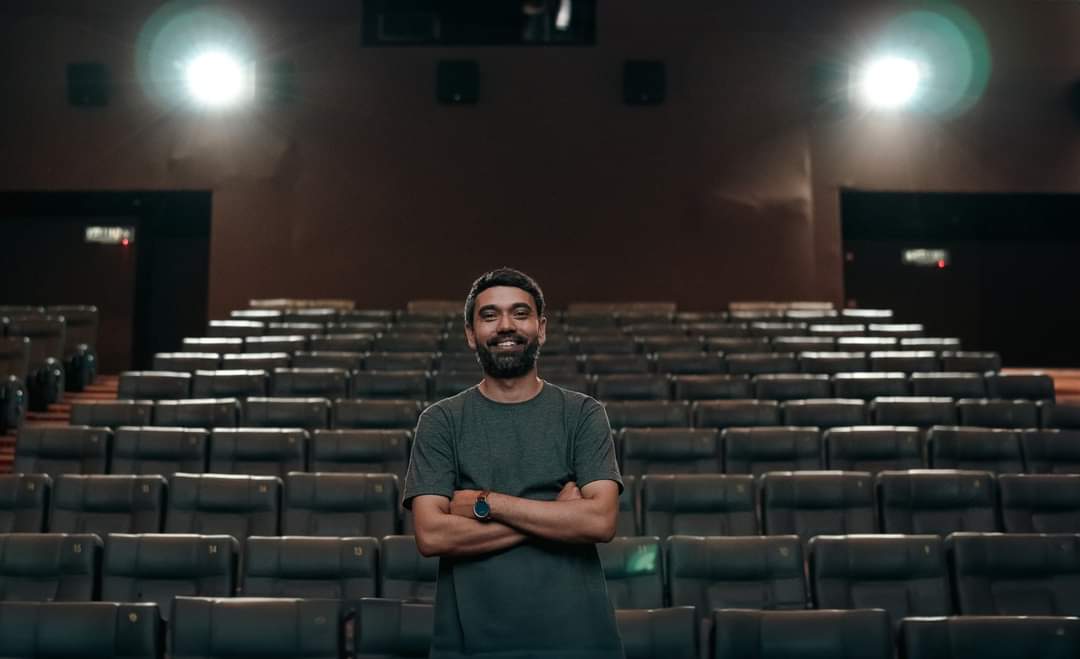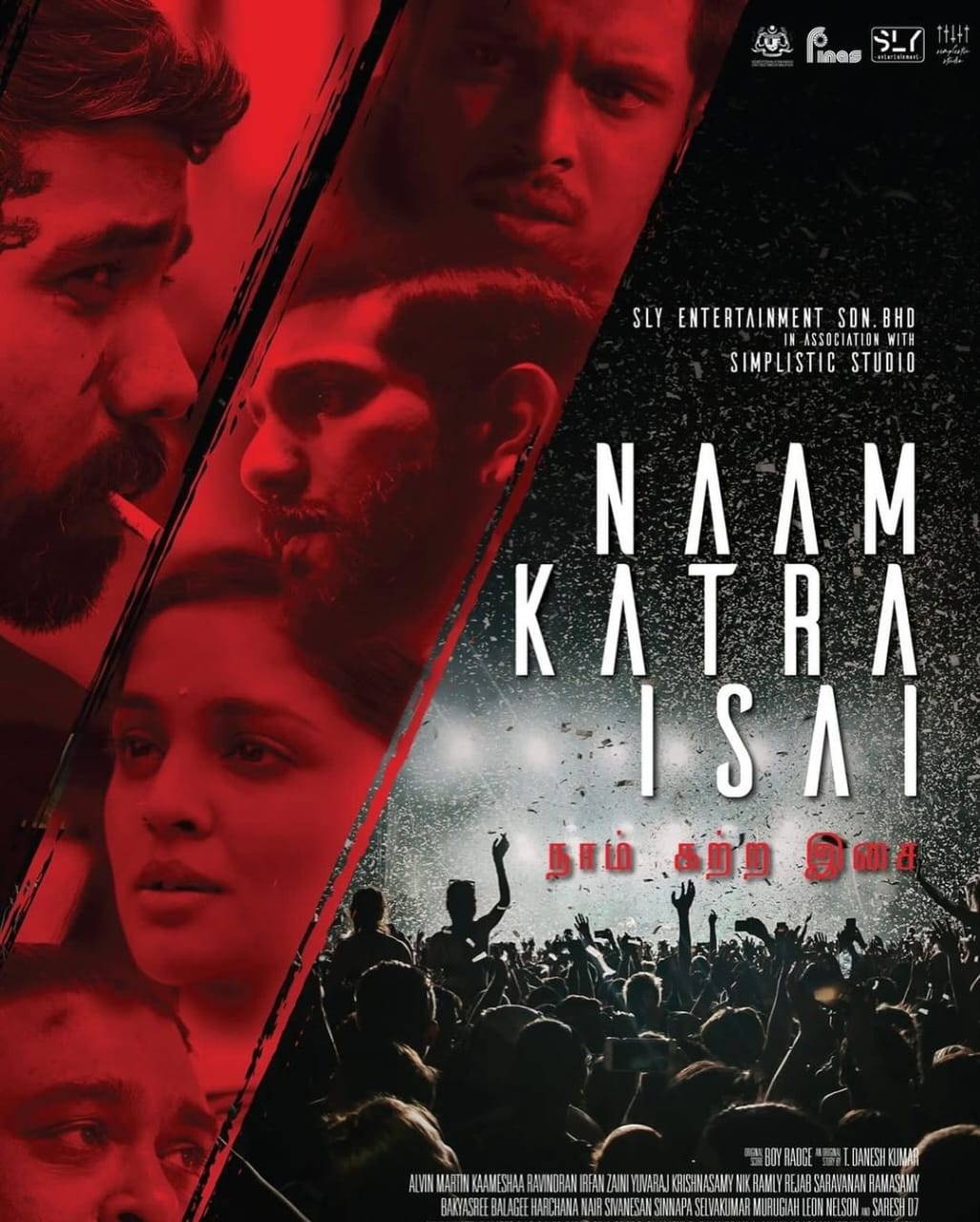The Malaysian Tamil cinema industry has traversed a fascinating journey since its inception, marked by remarkable evolution and enduring enhancements. Today, it stands as a evidence to the dedication and talent of numerous artists who have tirelessly strived to deliver captivating cinematic experiences. In a recent article, we delved into the perspectives of acclaimed Malaysian Indian directors on the industry’s trajectory, highlighting its evolution, the challenges encountered by artists, and the paramount importance of supporting them.

Continuing our exploration, we are privileged to feature the esteemed homeland artist, Saresh D7, in this interview. Danesh Kumar best known as Saresh D7, he embarked on his artistic odyssey in 2008, initially envisioning a career as a footballer. However, fate intervened with an accident, altering his path. Undeterred, Saresh found solace and expression in music, emerging as a rapper. Alongside his close-knit group of friends, he co-founded SLY Squad, a collective that served as their springboard into the industry.
Their debut release, “Ini Vendaam,” catapulted Saresh and his team into the limelight, swiftly becoming a sensation that reverberated with audiences across Malaysia. Even to this day, the infectious rhythm and poignant lyrics of “Ini Vendaam” endure, earning it a revered status in the playlists of many enthusiasts. Following his musical success, Saresh D7 transitioned into the realm of acting. His acting debut came in 2018 with the film “Sughamaai Subbulakhsmi,” directed by Karthik Shaamalan. This marked the beginning of a new chapter in Saresh’s career, as he ventured into the world of cinema. Since then, Saresh has continued to showcase his acting prowess in several notable films, including “Azhagiye Thee” and “Thirudathey Papa Thirudathey”. With each role, he has demonstrated versatility and depth, earning acclaim from audiences.

In a significant milestone in his career, Saresh ventured into directing with his groundbreaking debut film “Naam Katra Isai” last year. Released on November 23, 2023, the film delves into the intricacies of the music industry, portraying both its triumphs and challenges. Saresh’s directorial brilliance shone through in “Naam Katra Isai,” earning him and the movie a slew of prestigious awards and accolades. Notably, the film was honored with the Popular Movie of the Year award, along with accolades for Best Villain, Best Choreographer, and Best Editor at the 3rd edition of the MICA Awards. Additionally, Saresh was bestowed with the Icon of the Year award for his outstanding contribution to cinema.
Further adding to its accolades, “Naam Katra Isai” received recognition at the 15th Norway Tamil Film Festival, where it secured awards for Best Screenplay, Best Actor, and Best Music Director. The film’s success continued to soar as it was recently honored with the esteemed title of “Best Asian Movie” at the 16th Edison Awards. Saresh shared his experiences and perspective on the Malaysian Tamil cinema industry with Varnam Malaysia.

When asked to describe himself in just three words, Saresh’s response was “Fun, Positive, and Unique.” These words succinctly capture his character, portraying him as someone who exudes positivity and individuality. In addition to his artistic talents, Saresh is known for his humility and down-to-earth demeanor within the industry. As he continues to ascend in his career, he remains grounded and approachable, earning him admiration from peers and fans alike.
One of the most remarkable aspects of Saresh’s personality is his unwavering support for fellow artists, regardless of their stature in the industry. This is evident in his active engagement on his Facebook, where he regularly shares information about every Malaysian Tamil film that hits the theaters, including cinema listings and words of encouragement for the artists involved. His genuine desire to uplift others and promote the industry reflects his deep love and respect for the art of cinema and the Malaysian Tamil film community. Saresh’s vision extends beyond personal success; he harbors a genuine aspiration to see the Malaysian Tamil cinema industry thrive collectively. His commitment to fostering growth and unity within the industry is invaluable, and his presence serves as a source of pride for the Malaysian Tamil cinema community.
From almost being removed from cinemas shortly after release to being honored as the ‘Most Popular Movie’ at the MICA Awards, ‘Naam Katra Isai’ has made history in Malaysian Tamil Cinema. How does this victory make you feel?
I am truly elated by this victory. It’s a testament to the power of the public, and I firmly believe that this honor should be dedicated to them. Without their unwavering support, none of this would have been possible. Winning the “Most Popular Movie” award, especially in a voting category, highlights the impact of the audience’s choice. Their votes not only secured this accolade but also extended the theatrical run of ‘Naam Katra Isai,’ defying the odds it initially faced of being removed from cinemas shortly after release.
I believe the public resonated with something in the film that compelled them to choose it. Their appreciation and endorsement have been instrumental in our success. Additionally, I must acknowledge the tireless efforts, love, and dedication invested by the entire team behind ‘Naam Katra Isai.’ This victory is a culmination of their hard work and commitment to delivering a memorable cinematic experience.
Saresh didn’t forget to express his gratitude to the public and his team for their dedication and support. However, the movie deserves even more recognition. Malaysian Indians are often the primary audience for Malaysian Tamil films since these films are typically released only in Malaysia. The success and longevity of a film’s theatrical run depend heavily on its initial reception by the audience. If a film doesn’t draw enough viewers within the first four days, it risks being removed from theaters.
In contrast, Kollywood movies from India can sustain their theatrical presence for weeks, allowing audiences to catch them at their convenience. However, the same luxury isn’t extended to local Malaysian Tamil films due to a lack of widespread support. This disparity often results in Malaysian Tamil films struggling to achieve successful theatrical runs. Malaysian Indians should begin to delve into Malaysian Tamil films, as there are genuinely exceptional works being produced.
As all of us know, it took quite an extended period for the movie to hit the screens. Could you elaborate on the struggles you faced in delivering the best to the audience and how you overcame them?
As many are aware, the journey to bring the movie to the screens was indeed a prolonged one. Initially, we commenced filming before the onset of the COVID-19 pandemic. However, the sudden outbreak necessitated a halt in our production, significantly delaying the movie’s progress. When we eventually resumed filming post-pandemic, the lingering effects of COVID were still palpable, with everyone required to wear masks for safety. Given that our earlier shots were mask-free, I was determined about maintaining consistency in depicting a normal environment throughout the film. Additionally, I had to prioritize the health and well-being of our crew members. Due to the pandemic and subsequent hectic schedules, several artists were unable to commit to the shoot. Understandably, this posed a significant challenge in maintaining continuity and managing the cast’s appearance, as many were concurrently involved in other projects.
Furthermore, an unforeseen incident further compounded our difficulties. Following a long shoot schedule, during an evening meal, our vehicle was vandalized, resulting in the theft of essential equipment such as cameras, drones, and cash. With no backup footage available, the loss was particularly devastating. Despite this setback, I persevered, utilizing alternative options to shoot and edit the remaining portions of the film. Regrettably, approximately 20% of the filming had to be completed without the main cast, presenting an additional hurdle to overcome. Nevertheless, I remained determined to give my best despite the challenges, ultimately managing to complete the film. Reflecting on these trials, I consider myself blessed to have surmounted them and brought the project to fruition.

Despite facing numerous hurdles, Saresh’s resilience, confidence, and the unwavering support of his team led to the successful release of “Naam Katra Isai” in cinemas, which is truly commendable. Saresh’s determination and hard work have paid off, evident in the multiple accolades and awards the film has received. “Naam Katra Isai” is now making waves on international platforms, showcasing the potential of Malaysian Tamil films.
The crowning achievement came when the movie was honored as the “Best Asian Movie” at the 16th Edition Awards in Chennai, in the presence of esteemed directors and artists from the Kollywood industry. What began as a struggle to sustain screenings in Malaysian theaters has now transformed into international recognition and acclaim.
This success story underscores the importance of supporting Malaysian Tamil films. Without experiencing these films firsthand, the public may not fully appreciate their value and the exceptional works being produced in the Malaysian Tamil cinema industry. By exploring and believing in local productions, audiences can provide the encouragement needed for filmmakers to continue pushing boundaries and elevating their craft.
When asked what propelled him to persevere and complete the film despite the numerous challenges, Saresh emphasized that it was the passion and the dream he held for this project, along with the collective effort of the team, that kept him going. He highlighted the dedication and hard work the team poured into the project, describing it as a labor of love. Furthermore, Saresh pointed out that there were approximately 200 newcomers involved in the project, and he was determined to showcase their efforts on the big screen and introduce them to the wider world. This was his primary goal and served as the main source of motivation for him to see the project through to its completion.
How did you feel when witnessing your movie having a successful theatrical run?
Witnessing the movie enjoying a successful theatrical run was indeed a mixed experience for me. Typically, local films only have a limited window of four days to prove themselves at the box office. If they fail to perform within this timeframe, they risk being removed from theaters. Prior to the movie’s release, I had already shared this information with the audience.
However, there was also another video shared by Irfan with genuine intentions, although it received mixed reviews. Some viewers perceived that the movie wasn’t well-received, and they interpreted our message as a plea for everyone to come and support us. . I remained firm in my belief that we shouldn’t ask people to support us. While the video was released without my knowledge, it wasn’t part of our promotional strategy. It was a genuine message. Despite this, there were individuals who reached out to me with positive reviews and appreciation for the film. They mentioned that if it weren’t for the video, they might have overlooked the opportunity to experience such a good movie. Ultimately, I felt grateful for my crew, the audience, and every individual who extended their support to the film.
When asked about his thoughts on how to cultivate audience interest in watching Malaysian Tamil films, Saresh emphasized that audience involvement and interest should come organically. He acknowledged the prevailing perception that Malaysian Tamil films may not always meet expectations, but he also noted the difficulty audiences face in investing time and money into films that may not deliver.
Saresh suggested that audiences could assess a film’s potential by examining its trailer and publicity materials, allowing them to make decisions about which movies to watch in theaters. Furthermore, he emphasized the importance of honest reviews from those who have seen the films, as the Indian community in Malaysia is relatively small, and word-of-mouth recommendations can significantly influence others’ viewing choices.
Saresh encouraged viewers to share constructive feedback with filmmakers, highlighting that many are receptive to audience input and actively seek ways to improve their craft. By incorporating audience suggestions, filmmakers can enhance the quality of their future projects. The healthy competition among Malaysian Tamil films was evident at the recent 3rd edition of the MICA Awards, with numerous choices and nominations in each category. Saresh attributed this to filmmakers’ commitment to delivering their best and continuously striving for improvement, leading to notable advancements in the quality of local Tamil cinema compared to earlier years.
Aside from all these considerations, the main question remains: are members of the public coming to theaters to watch our films? I firmly believe that this will change once people begin to explore our films. It’s important not to compare our films to those of Kollywood, as they have been established for many years and are more advanced in many aspects. However, we are continuously raising our standards, and I have full confidence that we can evolve further. With continued involvement and support, I am optimistic that this evolution will happen sooner rather than later.

When asked about the importance of recognition and support for artists, Saresh emphasized the significance of giving individuals a chance to showcase their talents. He highlighted the difference between dismissing someone’s capabilities without affording them an opportunity versus providing them with a platform to demonstrate what they can achieve. Saresh stressed that granting individuals opportunities is crucial, especially in the cinema industry, as it allows their talents to be discovered and nurtured.
He expressed concern that invalidating someone’s abilities without giving them a chance can lead to discouragement and a loss of passion for their craft. Saresh emphasized his determination to complete and bring “Naam Katra Isai” to the screen stemmed from this belief. He asserted that everyone possesses talent, and there are no limitations to it. Therefore, it’s essential to refrain from discouraging individuals who exert effort and showcase their talents, as this can stifle their growth.
While awards and recognition are undoubtedly important, Saresh emphasized that genuine recognition and appreciation from the audience hold greater significance for artists. He emphasized that encouragement and support from viewers help artists advance further in their careers. Ultimately, Saresh emphasized that there is nothing more significant for an artist than recognition and appreciation for their work from the audience.
Saresh’s profound love for the artistry of the Malaysian Tamil cinema industry radiates through his unwavering dedication, evident in every answer he provides. His commitment and perseverance in bringing “Naam Katra Isai” to the big screens, despite enduring numerous struggles over many years, serves as a poignant example of a filmmaker’s devotion to their craft. It highlights the immense effort and time invested in the creation of a film. Unlike individuals in conventional 9-to-5 jobs, filmmakers and their teams sacrifice significantly to bring a project to fruition. They pour their hearts and souls into their work, striving to deliver the best possible cinematic experience for their audience. Yet, amidst their tireless efforts, many of these endeavors often remain underappreciated, obscured by the label of “Malaysian Tamil Film.”
However, it is crucial to recognize that these filmmakers produce works of art that deserve acknowledgment and celebration. Despite the challenges they face, there are undoubtedly gems within the Malaysian Tamil film industry that merit attention. Yet, regrettably, these cinematic treasures frequently go unnoticed. The narrative surrounding Malaysian Tamil cinema must shift. As audiences begin to engage with these films, they will discover a rich tapestry of storytelling, cultural nuances, and artistic expression waiting to be explored. By embracing Malaysian Tamil cinema, we not only honor the dedication and passion of its creators but also open ourselves up to a world of cinematic excellence that deserves to be celebrated and cherished.
The journey of Malaysian Tamil filmmakers, exemplified by Saresh’s unwavering commitment, is a testament to the resilience and dedication of artists within the industry. Their efforts deserve recognition and appreciation, and it is incumbent upon audiences to actively engage with and support Malaysian Tamil cinema, thus paving the way for a brighter future where these films receive the acclaim they truly deserve.
Full interview on YouTube:

This is a Varnam Exclusive Feature! Reproduction requires a credit to Varnam Malaysia.
Follow us on Instagram, Facebook or Telegram for more updates and breaking news.













